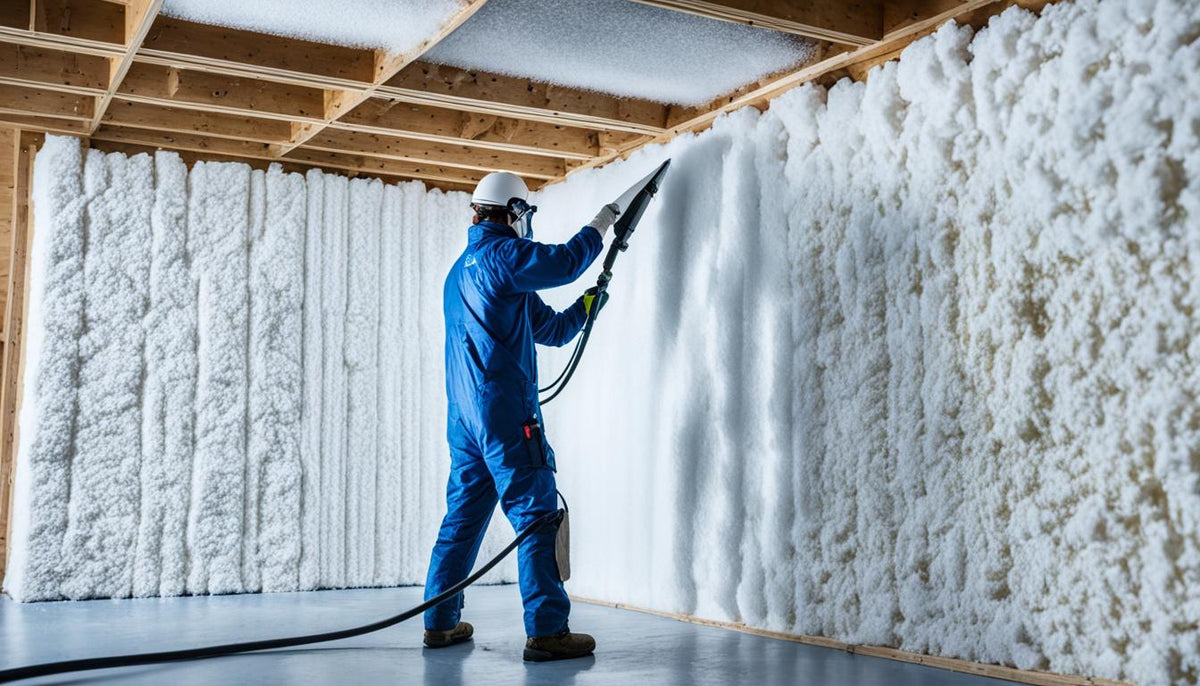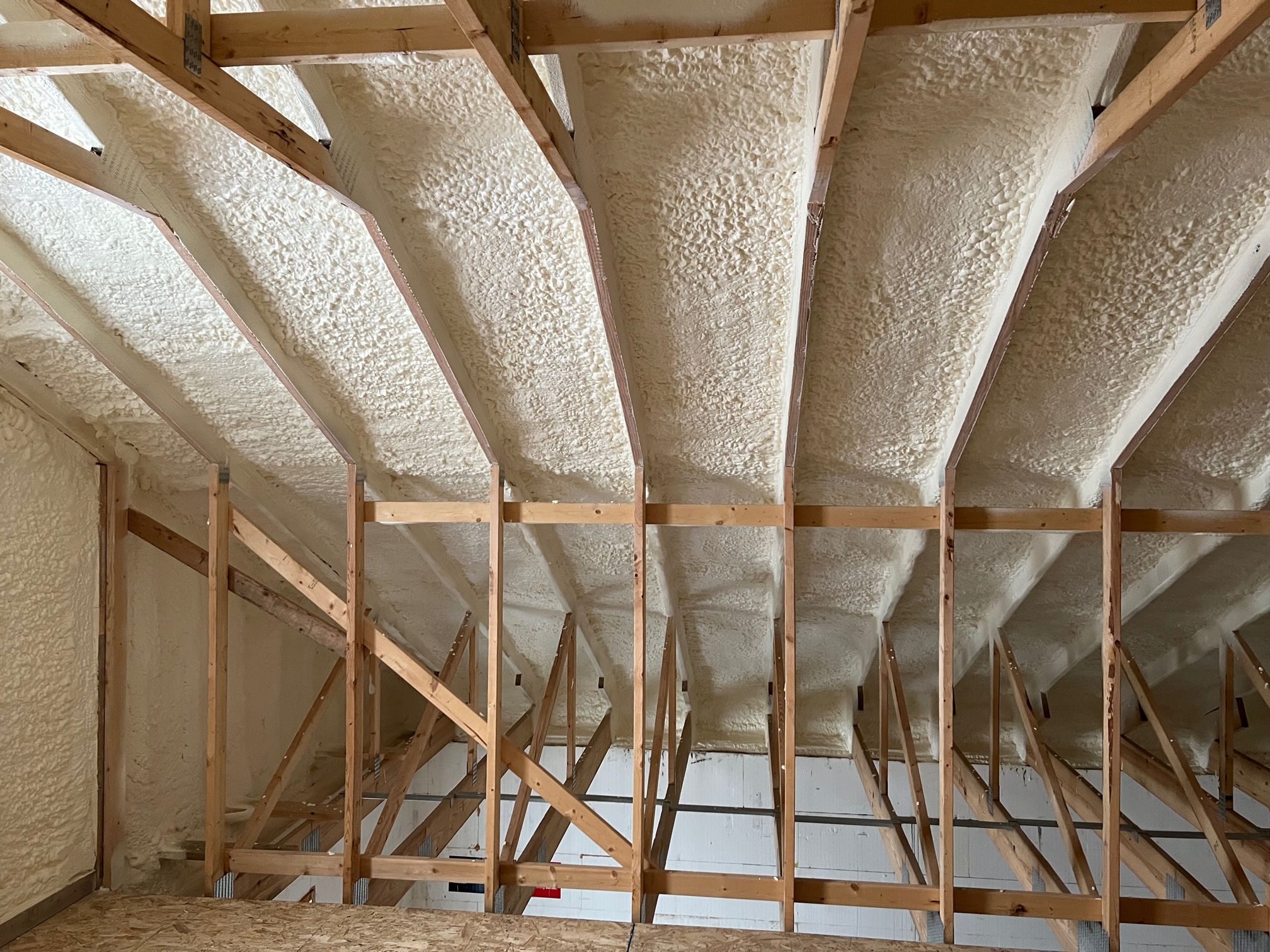Selecting the Right Type of Spray Foam for Your Insulation Requirements
Selecting the Right Type of Spray Foam for Your Insulation Requirements
Blog Article
How Spray Foam Can Improve Power Efficiency in Any Structure
Spray foam insulation has emerged as a critical remedy for enhancing energy effectiveness across numerous structure types. As property proprietors significantly seek sustainable solutions, the effects of spray foam insulation prolong beyond plain utility cost savings.
Recognizing Spray Foam Insulation
Spray foam insulation is progressively recognized for its premium thermal performance and convenience in numerous applications. Made up largely of polyurethane, this insulation material is applied as a fluid that broadens upon call, loading spaces and creating a smooth barrier. This unique residential or commercial property allows spray foam to adapt irregular surfaces, making it a suitable choice for both business and property structures.

Application of spray foam insulation is generally carried out by experienced professionals using customized devices, making certain optimal efficiency and safety and security - Spray Foam. The healing procedure is rapid, permitting for fast installment and very little interruption. Consequently, spray foam insulation is significantly being used in brand-new building and construction and retrofitting projects because of its ability to enhance architectural integrity while boosting total energy efficiency in buildings
Advantages of Power Efficiency
Power performance plays a crucial function in lowering functional expenses and minimizing ecological impact across various fields. By optimizing energy use, home owners and businesses can accomplish substantial financial savings on utility bills, which directly boosts monetary efficiency. Effective energy usage means less dependence on nonrenewable fuel sources, thus adding to a reduction in greenhouse gas exhausts and promoting a much more lasting atmosphere.
Furthermore, energy-efficient structures typically experience enhanced residential or commercial property values. As energy costs rise and sustainability comes to be a concern for consumers, residential or commercial properties with enhanced power efficiency features are much more attractive on the market. This trend urges investment in energy-saving modern technologies, which can even more drive innovation and economic development.
In addition to ecological and financial benefits, power effectiveness can additionally improve the total convenience and health and wellness of interior rooms. Appropriate insulation and efficient heating & cooling systems assist preserve regular temperature levels, minimizing drafts and humidity degrees, which subsequently can result in far better indoor air top quality.
Eventually, the benefits of energy performance extend past prompt cost savings, fostering a resilient economic situation, advertising environmental stewardship, and boosting the top quality of life for occupants in any kind of building.
How Spray Foam Functions
Usually used as a liquid, spray foam broadens quickly upon call with surfaces, developing a solid barrier that efficiently seals spaces and splits. This distinct home results from its chemical structure, mainly including isocyanates and polyols, which respond when blended to develop a foam that adheres and fills spaces to various products, including concrete, steel, and timber.
When used, the foam broadens to numerous times its original quantity, making sure a limited seal that prevents air leak. This procedure considerably lowers thermal connecting, which takes place when heat transfers via materials, leading to energy loss. The foam's high R-value, a procedure of thermal resistance, contributes to enhanced insulation by minimizing heat transfer between the interior and outside environments.
Additionally, spray foam is immune to wetness and pests, further boosting its effectiveness in maintaining power performance. Its application can be tailored to various areas, consisting of attics, wall surfaces, and crawl rooms, optimizing insulation across a building. Spray Foam. Generally, the innovative style and application method of spray foam make it a reliable option for improving energy performance in any framework, leading to minimized energy costs and an extra sustainable built environment

Applications in Different Buildings
Various applications of spray foam insulation can be found throughout various building kinds, boosting energy performance and comfort. In household homes, spray foam is typically utilized in wall surfaces and attics to create a smooth barrier against air leaks, significantly minimizing heating and cooling down needs. This application is particularly valuable in older homes, where conventional insulation might be inadequate.
In business structures, spray foam insulation is related to roofing system systems and outside walls, which helps to enhance thermal performance and shield against moisture invasion. Its lightweight nature makes it an ideal choice for retrofitting existing frameworks without including considerable weight. Additionally, spray foam can be utilized in industrial settings to insulate pipes and storage tanks, preserving temperature control for delicate materials.
Institutional structures, such as schools and hospitals, gain from spray foam insulation by guaranteeing a constant indoor environment that supports occupant convenience and health. The adaptability of spray foam enables it to adjust to various building shapes and sizes, making it a preferred option for engineers and builders seeking effective insulation services. Overall, spray foam insulation functions as a crucial element in accomplishing energy-efficient buildings across all sectors.
Long-Term Cost Cost Savings
Spray foam insulation supplies significant lasting price financial savings for building proprietors and residents by decreasing energy consumption and reducing utility costs. By offering why not find out more a remarkable air seal, spray foam decreases the seepage of outdoors air, thereby improving the thermal performance of a building. This results in a lot more effective home heating and cooling processes, which can cause significant reductions in energy prices gradually.
In enhancement to instant financial savings on energy expenses, the toughness and longevity of spray foam insulation add to its economic benefits. Unlike typical insulation products, which may sag, work out, or weaken, spray foam maintains its effectiveness for decades, decreasing the need for frequent substitutes or repair work. This durability converts to lower maintenance costs and less interruption for owners.
Additionally, buildings geared up with spray foam insulation often enjoy a boost in home value, making them more attractive to prospective buyers or tenants. As energy effectiveness becomes significantly prioritized, homes with effective insulation solutions stand out out there. Eventually, the combination of spray foam insulation not only enhances convenience however also represents a tactical investment that produces significant economic benefits over the long term.
Final Thought
Finally, spray foam insulation works as an important component in boosting power efficiency throughout varied building kinds. Its capability to produce a smooth barrier versus air leak, incorporated with moisture-resistant residential or commercial properties and high r-values, substantially minimizes energy intake and linked expenses. The application of spray foam not only adds to regular indoor temperature levels however also increases residential property worth, emphasizing its function as a prudent financial investment for both property and industrial buildings.
Spray foam insulation has emerged as a pivotal solution for boosting power effectiveness across different structure types. Spray Foam. As a result, spray foam insulation is progressively being employed in check out here new construction and use this link retrofitting projects due to its capacity to boost architectural integrity while boosting general power performance in buildings
On the whole, the innovative design and application approach of spray foam make it a reliable solution for enhancing energy effectiveness in any structure, leading to decreased energy expenses and a more lasting built environment.
Various applications of spray foam insulation can be located across numerous structure types, improving energy effectiveness and convenience.In conclusion, spray foam insulation serves as a vital element in enhancing energy efficiency throughout diverse structure types.
Report this page